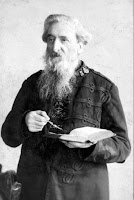 |
| General William Booth |
 One hundred and fifty years ago a couple made history. Through the dedication of Catherine and William Booth was formed the East London Christian Mission, which was later re-branded The Salvation Army. It was in the earliest days that the Mission, serving the poorest and most desperate families of Mile End, that the motto "soup, soap and salvation" summed up its prime function.
One hundred and fifty years ago a couple made history. Through the dedication of Catherine and William Booth was formed the East London Christian Mission, which was later re-branded The Salvation Army. It was in the earliest days that the Mission, serving the poorest and most desperate families of Mile End, that the motto "soup, soap and salvation" summed up its prime function.While, today, we see the SA as a benevolent organisation with a huge international reach and wide-ranging support networks, the early days were very different. Through its street work campaigning against the effects of alcohol, such was its success that street riots broke out, often at the behest of breweries and publicans, whose trade was negatively affected.
 |
| Courtesy Salvation Army |
 |
| Courtesy Salvation Army |
The organisation's main base in St Albans, its citadel, is in Victoria Street. It had arrived in the city to carry on its evangelising work, and in 1883, purchased the former private baths and swimming pool site in that road. Later the structure was rebuilt with a fine frontage. But the Army encountered the same battles here as elsewhere, and police had to be marshalled to quell the frequent riots.
The Salvation Army had other sites in the city too. The little church on Camp Hill was opened by the Salvation Army as a Sunday School in the late 1950s, having borrowed other accommodation in the interim. A site in Fleetville had been acquired from the brewery Benskin's. Now, that WAS a coup!
 |
| The printing works after extensions in Campfield Road. |
 |
| The Citadel in Victoria Street. |
If we lived in the Camp and Fleetville districts we all knew at least one Salvation Army family, and possibly several.
Today the Salvation Army may appear to be a very different kind of organisation from the traditional one some of us remember, but if there is one service the Army has always been known for it is putting in touch parents and their offspring when the latter have encountered issues which resulted in them leaving home and tearing apart from their roots.
On this one hundred and fiftieth anniversary, happy birthday Salvation Army.

No comments:
Post a Comment